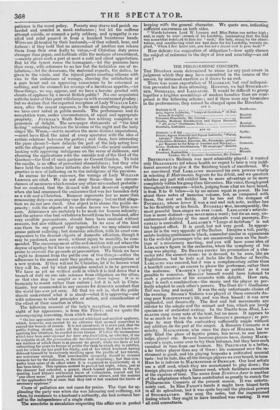THE PHILHARMONIC CONCERTS.
THE Directors seem determined to atone for any past errors in judgment which they may have committed in the course of the season, by in6reased exertion as it draws to an end. There was some expectation of IVIaeineas4 but real indisposition prevented her from attending. However, we had SromenktuSEN, DONZ ELM, and LABLACHE. It would be difficult to group together a brighter assemblage of modern beauties than are comprised in the following scheme' and if there were any blemishes in the performance, they cannot be charged upon the Directors.
ACT I.
Sinfonia in D . . . . Beethoven.
Aria, Signor Lablache, "Largo al factotum," (II Bar
biere di Seviglia) . • ..... . ...... Rossini. "Concerto Pianoforte, Mr. Cramer ... ...... . Mozart. Duetto, Madame Stockhausen and 'Signor " Ah,situ," (Guillaume Tell).. Rossini. Overture, Lodoiska . . Cherubini.
ACT II.
Sinfonia in E Eat . Spohr. Duetto, Signor Damen' and Signor Lablache, " Parlar, spiegar, ' (Mosb in Egitto) Rossini. Concertino Militaire, Bassoon, Dlr Preumayr, (princi pal Bassoon to the King of Sweden and Norway) .. Cremont.
Scena, Madame Stockhausen, " sospinge," (Zemira
e Azor).. .. . . . ..... •.
Overture, Zau'berfloie .. . ... . .. . .......... Mozart.
Leader, Mr. F. eramer—Conductor, Mr. eramer.
BEETHOVEN'S Sinfonia was most admirably played : it wanted only DRAGONETTI (of whose health we regret to hear a very indifferent account) to give it the finishing touch of 'excellence. We are convinced that LABLACHE measured his own powers wisely in selecting Ii Matrimonio Segreto for his &bill, and we question whether any part will exhibit him to more advantage or be more completely within his grasp than Geronimo. His voice, though good throughout its compass—which, judging from what we have heard, is from E to G below—is by no means equal inpower. He has about three notes of immense volume, but, as compared with these, the rest are feeble. If he has not the compass of ZUCHELLI, whose lower E was a real and rich note, neither has he his flexibility or his finish. ZUCHELLI was; incomparably, the most graceful bass-singer we -ever heard. LABLACHE'S articulation is more distinct—you never miss a word ; but for an easy, unembarrassed delivery of the most elaborate vocal passages, &reinter.' is unrivalled. LABLACHE'S "Largo al factotum" is not his happiest effort. It is good, but not very good. In appearance he is the very opposite of the Barber. Imagine a tall, portly, sedate-looking gentleman in black, somewhat similar in appearance to the well-fed personages who are occasionally seen on the hustings of a missionary meeting, and you will have some idea of LABLACHE'S figure in the orchestra, when the symphony of his song was playing. DE BEGNIS carries his personation of a character into the concert-room: he is dressed, to be sure, like an Englishman, but he feels and looks like the Barber of Seville. LABLACHE was encored, but it was a complimentary rather than a heartfelt encore ; an encore to please the performer, rather than the audience. CRAMER'S paying was as perfect as it was possible to conceive. MOZART himself would have listened to such a portraiture of his concerto with delight. How rare, alas ! is such a combination—the music and the player so perfectly adapted to each other's powers. The Duet freee Guillaume Tell was long and insipid. It was the only unfortunate choice of the evening. SPOHR'S Sinfonia was played at these concerts during poor Kiesewerrea's life, and was then hissed : it was now applauded, and deservedly. The first and last movements are inferior to the adagio and the minuet and trio, which are lovely specimens of orchestral writing. In the Duetto from Mosd, LA.• BLACHE sang every note of the text, but no more. It appears to be as much as he can do to master Rossisn's passages ; or perhaps he may think the embroidery sufficiently ample without any addition on the part of the singer. A Bassoon Concerto is a novelty. MACKINTOSH, who since the days of HOLMES, has so ably filled the place of fagotto primo, has never, to our knowledge, played one. Several bassoon-players have, during MACKINTOSH'S reign, come over to try their fortunes, but they have each vanished in turn from our horizon. Mr. PREUMAYR IS a better, a far better player than any of these : his command over the instrument is great, and his playing bespeaks a cultivated musical taste : but he fails, like all the foreign players we ever heard, in tone Here he is inferior to MACKINTOSH or DENMAN. Our best artists use a stiff reed, which they are accustomed to play down; the foreign players employ a thinner reed, which facilitates execution at the'expense of tone. The scene from Zemira e Azor is another of the adaptations which have contributed so greatly to enrich the Philharmonic Concerts of the present season. It was unfortunately cast. In Miss Parole's hands it might have blazed forth in all its splendour, but it was quite beyond the physical powers of STOCKHAUSEN. She sang the notes, but the impassioned feeling which they ought to have breathed was wanting. It was all cold correctness.


























 Previous page
Previous page